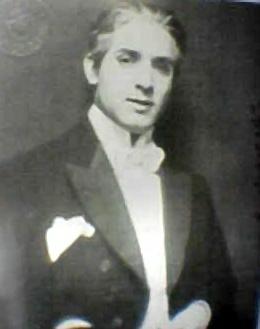Pepe Romeu's real name was José Rizo Navarro; he was the son of the well-known actress Rafaela Rizo Navarro. Romeu was the name of his
stepfather, another actor, who adopted him.
At a young age, he started to appear as an actor in straight theater: at the Teatro Eslava in Valencia, at the Infanta Isabel in Madrid, again
at the Eslava, and then at the Teatro Español in Madrid, where in 1919 he premiered La cenicienta by the eminent Spanish
playwright and 1922 Nobel Prize winner Jacinto Benavente, who was the Español's director at the time.
Romeu's breakthrough came in Caracas, Venezuela, in 1921: he toured South America with a troupe headed by another important Spanish playwright,
Francisco Villaespesa, whose play Bolívar they premiered in Caracas – a triumph for Romeu. When the troupe was in Buenos
Aires, he met Giacomo Lauri-Volpi, who strongly advised him to switch to singing, and
recommended him to conductor Gino Marinuzzi, who helped him into his new profession.
Back in Spain, Romeu continued to play straight theater and premiered, with his own troupe, La muerte del ruiseñor by Enrique
Contreras y Camargo and Leopoldo López de Sáa, at the Teatro Cómico in Madrid. But soon, Romeu became one of Spain's
leading zarzuela tenors (without entirely abandoning straight theater, though). He appeared a lot at the Teatro Apolo in Madrid, but also at
the Teatre Tívoli in Barcelona for instance, where he premiered La severa by Rafael Millán on 23 December 1925. At the
Apolo, he took part in the world premieres of El último romántico by Reveriano Sotullo and Juan Vert (9 April 1928), and
Los flamencos by Amadeo Vives (15 November 1928).
Romeu also shot several films (both musical and not) from 1922 to 1958.
After a vocal crisis, he returned exclusively to the straight theater, being particularly associated with the works of Jacinto Benavente, who
had already been crucial for the early stage of Romeu's career. Shortly after Benavente's death, the world premiere of Benavente's posthumous
play Por salvar su amor (Teatro Calderón, Madrid, 3 November 1954) boasted Romeu as both stage director and actor. Late in his
life he was a member of the jury in the vocal competition "María Ros de Lauri-Volpi", founded by Giacomo Lauri-Volpi in homage to his
late wife María Ros.
Although singing was in fact his second job, Romeu's vocal and technical excellence, his crystal clear diction and his absolutely outstanding
and highly individual musicality put hundreds of full-time and life-long opera singers to shame; his timbre is certainly not conventionally
beautiful, and yet his recorded legacy is certainly among the best of all singers, and perhaps the very best of all zarzuela tenors.
Reference 1, reference 2: Aria CD booklet ("50 tenors
espanyols"), reference 3, reference 4, reference
5
